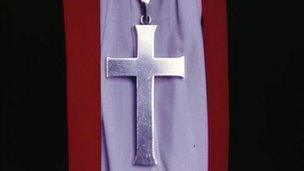Women bishop supporters angry after draft law amended
- Published

The process to change Church law to allow women bishops began in July 2000
Supporters of women bishops in the Church of England have reacted angrily after last-minute amendments to the draft law allowing their appointment.
The legislation is due to be voted on at the Church's8 General Synod in July.
But the synod's House of Bishops made two final amendments to the draft measure on Monday at a meeting in York.
The group Women and the Church (Watch) accused it of making concessions to opponents of women bishops which would undermine the ministry of women.
A group of officers of the synod known as the Group of Six, which includes the Archbishops of Canterbury and York, must agree the amendments do not alter the substance of the proposals, at a meeting this week.
If they do not agree the law cannot be sent back to the general synod for a final vote in July.
Traditionalists opposing female bishop ordination have argued women should not be made bishops because Jesus chose only men as his apostles and leaders of the early Church.
Some insist a woman cannot truly become a bishop, with the result that men she ordained would not actually become priests or be able to carry out the functions of a priest.
Others believe the Bible requires male headship in the family and in the Church.
Most, however, have accepted women bishops will be created and have focused on getting exemptions from serving under them.
Female authority
The House made two changes to the draft measure.
The first centres on whether a female bishop's legal authority would be diminished, if a traditionalist parish requested access to an "alternative" male bishop.
The amendment addresses a situation in which, if a parish in the diocese of a female bishop refused to recognise her authority, the bishop could delegate her powers to an alternative male colleague.
It makes it clear that though the alternative male bishop derives his legal authority from the diocesan woman bishop who appoints him, the authority to exercise the office of a bishop comes from his own ordination.
This is an area of serious disagreement - supporters of women bishops are anxious a woman should not be a "second class bishop" and their opponents are concerned the alternative bishop should not derive his authority from a woman.
The second change adds to a new code of practice for bishops, being drawn up for approval if the consecration of women bishops is passed by the general synod.
Not "far-reaching"
It states further guidance will be issued, surrounding the opting-out of parishes who decide on the grounds of theological conviction, that they do not want a female bishop.
That guidance will be directed at ensuring the exercise of ministry by bishops and priests appointed to serve in parishes which object to women bishops, will be consistent with those objections.
In statement the House said: "We rejected more far reaching amendments that would have changed the legal basis on which bishops would exercise authority, when ministering to parishes unable to receive the ministry of female bishops."
But supporters of women bishops fear the creation of a "double-standard" of authority, where so-called "untainted" male bishops (those who have not ordained female clergy or received ordination from a woman) become sought after by traditionalist parishes.
Watch responded that the House of Bishops "have failed to listen to the voice of ordained women and those who support their ministry and been swayed by those who are opposed into making concessions that can only undermine the ministry of women in future years".
"Their decision to intervene in this way will significantly undermine the credibility of the House of Bishops both inside and outside the Church," it continued.
Watch said it was considering the amendments in detail and would issue a full response after a meeting in Birmingham on 27 May.
Evangelical group Reform has expressed its disappointment that compromise options it had previously suggested had not been "acted upon."
The Reverend Rod Thomas, chairman of Reform, said: "While we recognise that these small amendments could be helpful, we are dismayed that the assurance for our future ministry within the Church will rest on what a code of practice says.
"Not only have the provisions of this code yet to be agreed, but also... codes of practice are frequently changed over time. This means that we are being asked to base our futures on a shifting foundation.
"We are concerned that those considering ordination in the future could be discriminated against because of their views on the difference between men's and women's ministries."
Anglo-Catholic group Forward in Faith, which opposes the potential ordination of female bishops, welcomed the amendments, but was said it was disappointed that an amendment conferring <link> <caption>"co-ordinate jurisdiction"</caption> <url href="http://www.bbc.co.uk/news/uk-16941311" platform="highweb"/> </link> on the alternative male bishops had not been passed.
In a statement, FiF said: "The draft measure stills fails... to address questions of jurisdiction and authority in the way we need."
The Church is composed of three Houses, of bishops, clergy and laity.
The change in the rules will require a two-thirds majorities in each House.
If approved in July, the Measure would go to Parliament for consideration by the Ecclesiastical Committee, the Commons and the Lords.
The earliest likely date for a woman bishop to be appointed would be 2014.
- Published20 May 2012
- Published9 February 2012
- Published6 February 2012